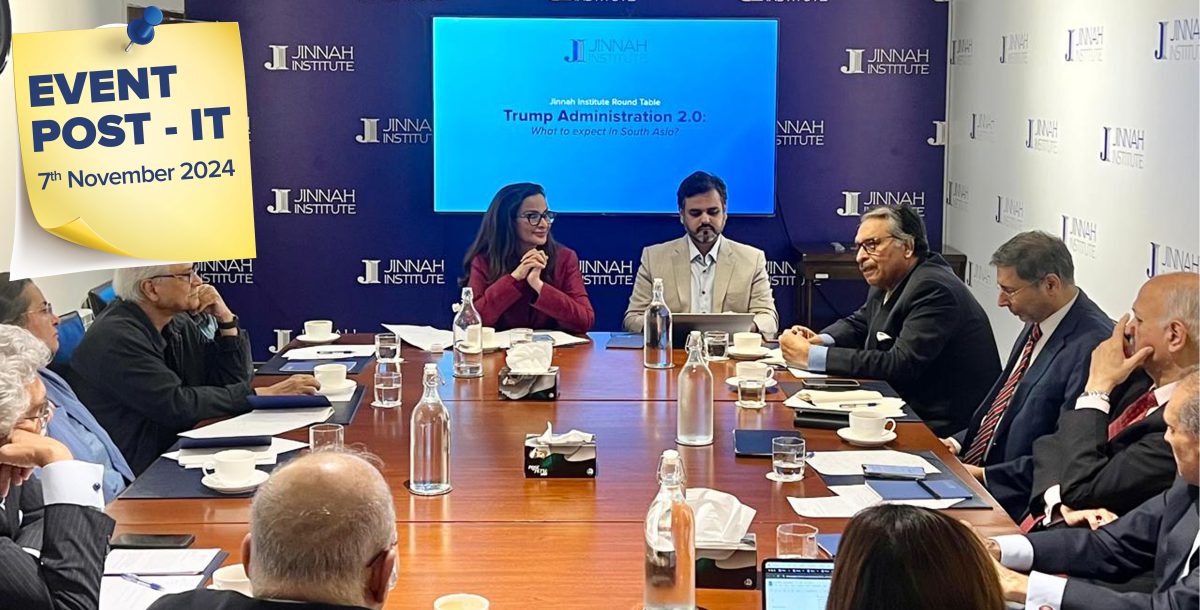Round Table
‘Transactional’ bilateral relations to continue under Trump: experts
Date: November 7, 2024
ISLAMABAD: Trump 2.0 follows the ‘grey rhino’ parable, that was expected to occur yet still serves a shock. For us in South Asia, any American presidency casts a shadow on the choices we exercise. Pakistan did not feature during Trump’s campaign, given the reduced attention Pak-US relations have in American policy circles; however, Pakistan will bear the impact of America’s strategic decisions in our neighbourhood, especially with Iran’s involvement in Gaza, and India’s pivotal place in the Indo-Pacific strategy. Trump’s potential climate denialism will also impact the climate funds receivable by Pakistan,” stated Senator Sherry Rehman. She was chairing Jinnah Institute’s roundtable titled ‘Trump Administration 2.0: What to Expect in South Asia?’ with senior policy stakeholders.
Senator Mushahid Hussain Syed stated that US politics has undergone a sea change from the Biden administration’s ideological delineation of the world, to Trump’s irreverence for political dogma and Cold War vantage points. He stated that Trump is a political ‘deal maker’, as evident from his book ‘The Art of the Deal’, and a Trump presidency will be positive for world peace. “A glimmer of hope in the Gaza conflict is that there is clear alignment between Iran’s strategic avoidance of war, and Trump’s interest in preventing more conflict,” he said.
Former caretaker Foreign Minister and Foreign Secretary, Jalil Abbas Jillani observed that political rhetoric aired during electoral campaigns should not be taken at face value, as any President coming into office is hemmed in by the establishment’s priorities. “Trump will have to pay heed to the same traditional stakeholders who shape American foreign policy. One of their priorities is to create an outcome on Ukraine that saves face for Western allies, and does not look like a total Russian win,” he stated. Jalil Abbas Jillani pointed out that the previous Trump administration had been very “transactional” with Pakistan, and was expected to be the same.
Former Foreign Secretary Aizaz Chaudhry agreed that the US will see policy continuity on China under Trump, on which he has threatened to impose a 40 percent tariff. Although India too has been mentioned as the “worst abuser” of tariffs, it will remain a key node of US Indo-Pacific policy. Israel will enjoy greater importance under Trump as he is indebted to the Israeli lobby, and the celebrations in Tel Aviv attest to his popularity. “A ceasefire in the Middle East may well be predicted, as Israel has achieved what it set out to do. Iran is already pushing ahead on its nuclear program, and we have not thought about the implications of a nuclear armed Iran next door,” he highlighted.
President Institute of Regional Studies Amb. Jauhar Saleem analysed that the US vote fell overall by 15 million during this election, not counting the mail ballots. The Democratic vote fell from 81 million to 67 million largely because of Kamala Harris’ inability to attract the traditional vote, despite Trump’s opposition. Amb. Saleem agreed with the assessment that Trump looks for political deals in difficult places, adding that he does not have ideological hangups or a political ego. “He is primarily a salesman, with a great deal of hyperbole, but his bark is worse than his bite,” he stated, adding that whichever presidency comes to the White House, there is constrained bandwidth for Pakistan with such an active Indian lobby in Washington DC.
Former Ambassador Zamir Akram stated it was unlikely that the second Trump presidency will focus on Afghanistan, unless there were an incident of terrorism. The greater foreign policy priority would be to normalise relations with Russia, and possibly drive a wedge between Russia and China. “The Chinese have taken a seemingly relaxed view of Trump’s win, saying it is the American people’s decision. Trump’s focus will be on competing with the Chinese, and for that relying on India as the net security provider,” he observed. Amb. Akram stated that neoconservatives advising the president perceive the loss of American lives and bloodshed as Pakistan’s fault, and that a second Trump administration is likely going to follow this legacy of thinking.
Author and television anchor Nasim Zehra stated that President Trump is not a conventional political actor and goes beyond the call of institutions. “’Having Trump in the White House provides us in Pakistan with an opportunity. Recognizing and taking advantage of that opportunity depends on breaking our age old, destructive habit of staying in reaction mode. We must try to do our homework for a change, and take charge of the bilateral relationship, instead of trying to fit into an American framework each time,” she said. Ms. Zehra added that the Pakistani diaspora’s pressure regarding Imran Khan was not marginal, and it should be factored into Pak-US relations.
Read Jinnah Institute’s Policy Paper on ‘Trump Administration 2.0: What to Expect in South Asia’

